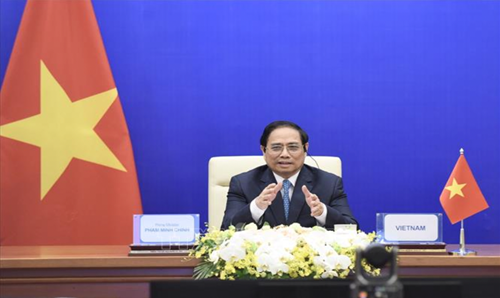The summit is being held in Japan’s Kumamoto city from April 23-24, with the participation of the country’s Emperor and Prime Minister, and the heads of State and Prime Ministers of Asian-Pacific countries, including six other ASEAN nations, namely Brunei, Cambodia, Indonesia, Laos, Thailand and the Philippines.
    |
 |
|
Prime Minister Pham Minh Chinh speaks at the fourth Asia-Pacific Water Summit. |
In his online remarks, Chinh stressed that the unprecedented synergistic effects of global challenges such as the COVID-19 pandemic, natural disasters, climate change, and over-exploitation of natural resources, including water, have been leaving serious and multifaceted consequences for today and future generations, thus requiring a global approach and solution.
In order to proactively respond to and minimize the negative impacts of these challenges, and also promote green, sustainable, inclusive and transnational economic growth, especially the post-pandemic recovery process, each country's efforts are a key and decisive factor, but international cooperation is important and breakthrough.
In that context, the Vietnamese Government leader proposed three groups of measures to be carried out in the region.
Firstly, it is necessary to intensify regional and international cooperation in an open, transparent, substantive and mutually beneficial manner, he said, adding that the international community should seriously and effectively implement international commitments on water resources, especially the United Nations Sustainable Development Goals 2030, the Paris Agreement and commitments at the 2021 United Nations Climate Change Conference (COP26), and the Sendai Framework for Disaster Risk Reduction 2015-2030.
Secondly, Japan and developed countries should pay attention to, share with and support developing ones in experience, finance, technology, governance, human resources training, basic investigation and planning on the use of water for the effective management, sustainable exploitation and equitable allocation of water resources.
Last but not least, it is important to boost cooperation and support the operation of organizaltions and cooperation mechanisms on transboundary river basin management such as the Mekong River Commission, and focus on promoting comprehensive solutions including digital transformation, encouraging the participation of businesses and people, promoting public-private cooperation, and strengthening smart water governance.
For Vietnam, water resources are at risk of decline due to over-exploitation, over-development of hydroelectricity in many places, along with the impacts of climate change and sea level rise, Chinh emphasised, adding that the country, therefore, always identifies water as a strategic resource that needs to be managed and used appropriately, safely and effectively to promote development in a green, circular and sustainable direction, helping ensure the harmony and rationality between economic growth, environmental protection and climate change adaptation.
The Government leader also affirmed that over the past time, Vietnam has actively participated in and contributed to the common effort at all levels of international cooperation, especially with countries that share water sources with it such as Laos, Cambodia and China and other foreign partners to manage, develop, protect and use water resources from rivers sustainably and efficiently and for mutual benefit.
He took the occasion to thank international partners, including Japan, for their valuable support and wish to receive more effective support and cooperation from other countries, international organisations and business communities. He also affirmed his backing for the Kumamoto Declaration issued by the Government of Japan at this summit.
Source: VNA